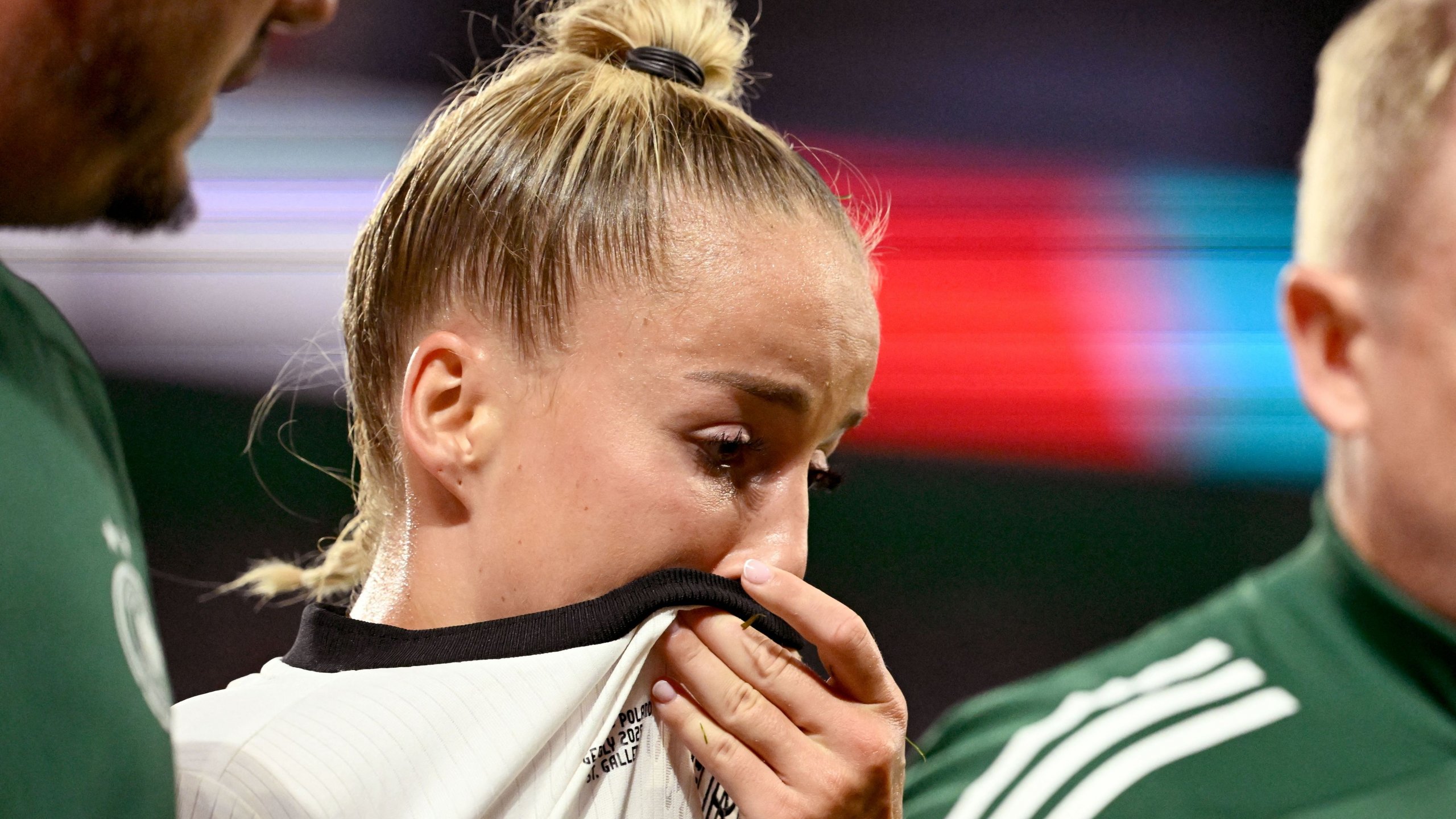Giulia Gwinn Injury Rocks Germany’s Euro 2025 Plans
Giulia Gwinn injury has thrown Germany’s UEFA Women’s Euro 2025 campaign into disarray, with the inspirational captain ruled out for the rest of the tournament after damaging her right knee in the opening-day win over Poland. The 26-year-old full-back collapsed clutching her leg midway through the first half in Hamburg and was stretchered off amid stunned silence. Subsequent scans at a Munich clinic confirmed a serious ligament tear that will sideline her for several months, wiping out her participation in the remainder of the competition and casting doubt over her availability for Bayern Munich at club level next season.
Giulia Gwinn injury: What happened on matchday one?
Germany had started brightly against Poland, pressing high and dominating possession. The mood soured on 22 minutes when Gwinn, making a trademark overlapping run, twisted awkwardly while attempting a cut-back. Medical staff signalled immediately for a substitution, with veteran defender Kathrin Hendrich entering in her place. Head coach Horst Hrubesch later admitted in the post-match press conference that “the atmosphere in the dressing room changed instantly; you could feel the shock.”
Primary blow for Germany women’s Euro 2025 ambitions
Losing a leader of Gwinn’s stature is more than a tactical headache. The Freiburg native not only wears the armband but also sets the emotional tempo of a side tipped as favourites to win a record ninth European crown. Her marauding runs, precise crosses and calming influence at the back have become trademarks since her debut in 2017. In qualifying, she ranked first among German defenders for progressive carries and second overall for chances created. Replacing that two-way production will be formidable.
Tactical reshuffle: Who steps up?
Hrubesch has two immediate options. Hendrich brings experience and positional sense but lacks Gwinn’s attacking thrust. Alternatively, young prospect Felicitas Rauch can shift from left to right, opening a slot for Julia Gwenzel on the opposite flank. Training-ground drills this week have focused on rapid transitions, with Lina Magull urged to drop deeper to compensate for the loss of width.
Squad depth tested by mounting injuries
Gwinn’s setback compounds existing issues. Midfielder Lena Oberdorf is nursing a calf strain, while striker Lea Schüller is just returning from illness. Germany’s famed depth now faces a stern audit, especially in knockout rounds where fine margins decide destiny. Sports scientists within the German FA are reportedly reviewing recovery protocols to prevent further casualties.
Giulia Gwinn injury timeline and recovery prospects
Doctors estimate a six-to-eight-month layoff following reconstructive surgery scheduled for next week. The procedure will be performed by renowned orthopaedic specialist Dr. Müller-Wohlfahrt, who treated Gwinn for a similar injury in 2020. Rehabilitation will include hydrotherapy, isokinetic strength sessions and biomechanical analysis to refine landing mechanics. Bayern Munich’s medical team will collaborate closely with the national setup, aiming for a January 2026 competitive return.
Psychological impact on the dressing room
Beyond the physical toll, losing a captain mid-tournament can erode collective belief. Sports psychologist Sabine Schmitz has been flown into camp to conduct resilience workshops and individual consultations. “We cannot replace Giulia, but we can honour her spirit,” midfielder Sara Däbritz emphasised, noting that the armband will rotate between Magull and Marina Hegering.
Opposition reaction and Group A permutations
Denmark, Germany’s next opponent, responded respectfully. Coach Lars Søndergaard remarked, “You never want to see a player of Gwinn’s calibre injured, but football moves on.” The Danes sit level on points after defeating Sweden, meaning Thursday’s clash in Frankfurt could determine top spot in Group A. Without Gwinn’s overlapping threat, Denmark may press higher, sensing vulnerability on Germany’s right side.
Historical context: Germany’s resilience after star injuries
This is not the first time Die Nationalelf have faced adversity. At Euro 2013, they lost Nadine Kessler to a knee issue yet won the title. Similarly, in 2022, Alex Popp’s injury before the final galvanised the squad, though they ultimately fell to England. Past precedent suggests Germany’s mental steel should never be underestimated.
Fans rally behind their captain
Support has poured in on social media. The hashtag #GwinnStrong trended across German-language platforms within hours, with teammates posting heartfelt messages. Merchandise partner Adidas announced limited-edition armbands bearing Gwinn’s signature, with proceeds donated to knee-injury research.
Opinion: A defining test of character
Germany’s tournament now hinges on adaptability. Losing a linchpin like Giulia Gwinn is undeniably damaging, yet it also presents an opportunity for emerging talents to forge their own legacy. If they navigate this crisis, the squad’s collective growth could outweigh the immediate loss, potentially turning a tragedy into the catalyst for a memorable championship run.
Your global gateway to nonstop football coverage:
News Goal
Share this content:

